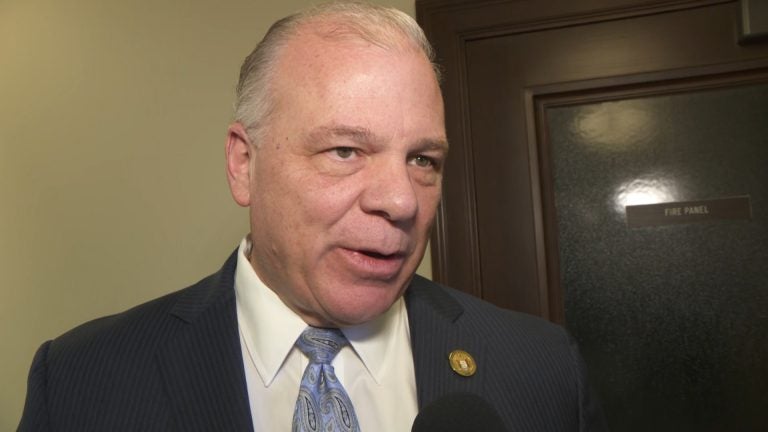Lawmakers to vote on permanent ‘Path to Progress’ panel
Senate President Steve Sweeney, who created the original reform group, says state’s deep fiscal woes require constant attention

Senate President Steve Sweeney. (NJTV News)
This article originally appeared on NJ Spotlight.
–
A commission closely resembling the ad hoc group empaneled by Senate President Steve Sweeney to tackle New Jersey’s long-standing fiscal challenges would become a permanent fixture in Trenton under a bipartisan measure that could soon win approval in both houses of the Legislature.
Created two years ago, the earlier panel — also comprising lawmakers, policy experts, but no one from the Governor’s Office — eventually drafted a lengthy and controversial report, called the “Path to Progress,” listing dozens of policy recommendations aimed at cutting costs for state and local governments that are borne by taxpayers.
Despite levying some of the highest tax rates in the nation, New Jersey has regular problems balancing its annual budget, and also maintains one of the worst credit ratings of any U.S. state. Recent tax-policy changes in Washington have also elevated federal income taxes for many New Jersey residents who can no longer fully deduct their state and local taxes, such as property taxes.
“We have a financial problem here,” Sweeney said Thursday as the bill that would establish the new commission went through legislative committees in both the Senate and Assembly.
Establishing the commission on a permanent basis was among the earlier group’s recommendations.
“Keeping it in front of everybody, hopefully we’ll start to get some things done,” Sweeney said.
Earlier panel sought to rein in worker benefits
Led by Sens. Paul Sarlo (D-Bergen) and Steve Oroho (R-Sussex), the informal group of experts empaneled by Sweeney in 2018 included former state Cabinet officers, university professors, economists, accountants and infrastructure analysts, among others. The group addressed five different policy areas in the “Path to Progress” report — public-worker and retiree benefits; K-12 education; county and municipal government; tax policy; and infrastructure.
Among the group’s most controversial recommendations were calls to offer all public workers less generous health insurance and to impose a new, hybrid retirement plan on many workers with less than five years of service instead of a traditional, defined-benefit pension plan.
The proposed worker-benefits changes have not won the support of Gov. Phil Murphy — a Democrat who maintains close ties to employee unions.
But the group also made dozens of other recommendations, including calls for school consolidations, special-education funding reforms, local shared services. Some pieces of legislation inspired by its report have advanced, including several bills that moved out of legislative committees on Thursday.
Among them is a bill seeking to incentivize more shared services between county and local governments, with funding already set aside in the state budget.
The bill creating the permanent commission, also now headed for a vote in both houses, calls for a similar 12-member panel comprising six lawmakers and six outside economic-policy experts.
Members of each house of the Legislature would occupy three seats, with two appointments made by the majority party — now the Democrats — and one by the minority party. The Senate president and Assembly speaker and the minority leaders in each house would be given the power to appoint the lawmakers on the panel.
The six outside policy-expert seats would be filled in a similar fashion, with the Senate president and Assembly speaker each getting to fill two, and the minority leaders one apiece.
The outside experts could be “academic, business, and other professionals who have knowledge, expertise, and practice experience in accounting, county and municipal government, economic analysis, governmental finance and fiscal management, and tax policy, implementation, practice, administration, and regulation,” according to the bill.
A spokesman for Murphy — who would not have a voice on the panel or play any role in selecting its members — declined to comment Thursday, citing the Governor’s Office’s general policy of not weighing in on pending legislation.
Funding not addressed
The commission would have the power to hire an executive director and a staff to conduct its work, but the bill does not call for a specific appropriation to fund its operations.
Assembly Majority Leader Lou Greenwald (D-Camden) suggested the panel would ultimately save money by coming up with new ways to reduce government spending.
“Bringing together the expertise of economists, academics and tax experts to evaluate our tax structures, as this bill would do with the creation of the New Jersey Economic and Fiscal Policy Review Commission, would help pave the way for solutions that create cost-savings and make long-term fiscal health in the state achievable,” Greenwald said.
With the current legislative session set to end Tuesday, it’s clear many of the bigger reforms called for in the “Path to Progress” report, including the public-worker benefits changes, will not make it to Murphy’s desk by the deadline. But Sweeney — who’s been leading an effort to generate grass-roots support for the report’s reform agenda — focused on the group’s recommendations that have been advancing Thursday.
“I’m appreciative that we’re going to get a few of the bills done from the Path to Progress, and then we start again next (legislative session),” he said. “It’s not going away.
WHYY is your source for fact-based, in-depth journalism and information. As a nonprofit organization, we rely on financial support from readers like you. Please give today.




